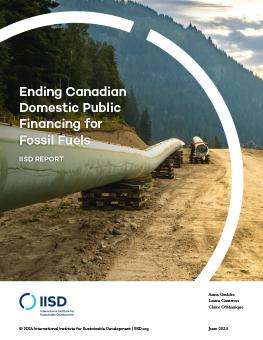
Ending Canadian Domestic Public Financing for Fossil Fuels
Public finance is a key tool used by governments to fund critical infrastructure needed to transition to renewable energy as well as direct capital and influence private investors' decisions. Ending public financing for fossil fuels is a critical driver of the energy transition. This report examines the scope of public financing for the fossil fuel sector in Canada and makes recommendations for Canada's forthcoming policy to eliminate this financing.
-
Export Development Canada and other Canadian crown corporations provided at least CAD 7.6 billion to CAD 13.5 billion annually (2020-2022) to the fossil fuel sector, compared to just CAD 147 million annually for domestic renewable energy.
-
Canada's policy to end domestic public finance for fossil fuels should include the full scope of public finance instruments, such as loans, equity, grants, guarantees, and insurance, as these supports serve to de-risk projects and provide confidence in fossil fuel investments.
-
Canada should publish a strong policy to end all public finance for fossil fuels this year, ensuring consistency with Canada's climate commitments and setting an example for peers ahead of the country's G7 presidency.
In recent years, Export Development Canada and other Canadian crown corporations provided at least CAD 7.6 billion to CAD 13.5 billion annually (2020–2022) to the fossil fuel sector, compared to just CAD 147 million annually for domestic renewable energy.
Canada’s policy to end domestic public finance for fossil fuels should include the full scope of public finance instruments, such as loans, equity, grants, guarantees, and insurance, as these supports serve to de-risk projects and provide confidence in fossil fuel investments. A strong policy should
- reproduce the strengths of Canada’s international public finance policy;
- cover financing for all fossil fuels across their entire life cycle;
- cover existing public finance, including direct government investments;
- cover financing for infrastructure, technology, and facilities that support fossil fuels;
- preclude public financing for the decarbonization of the oil and gas industry and fossil-derived hydrogen;
- include in its scope non-combustion uses of fossil fuels;
- close loopholes from other fossil fuel finance reform policies;
- include specific requirements for transparency and reporting;
- include clear, central enforcement and accountability mechanisms; and
- provide guidance for redirecting public finance toward climate solutions.
Canada should publish a strong policy to end all public finance for fossil fuels this year, ensuring consistency with Canada’s climate commitments and setting an example for peers ahead of the country’s G7 presidency and updated nationally determined contribution.
Participating experts
You might also be interested in
Identifying Inefficient Fossil Fuel Subsidies in Canada
This policy brief aims to provide decision makers with criteria to better define fossil fuel subsidies in the context of Canada's commitment to phase out these subsidies by 2023.
Ending Canada’s Support for Fossil Fuels
Canada has committed to ending subsidies and public financing for fossil fuels at home and abroad and has taken some important steps along the path. Our experts set out the journey so far, and how it can improve.
Unpacking Canada’s Fossil Fuel Subsidies
Fossil fuel subsidies hold us back and incentivize pollution. How much do Canada's governments subsidize fossil fuels, and why does it matter?
The Cost of Fossil Fuel Reliance
Government support for fossil fuels reached at least USD 1.5 trillion in 2023, new data shows.